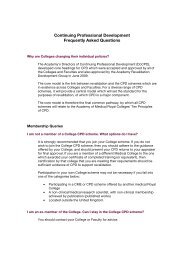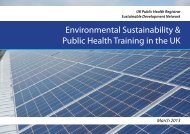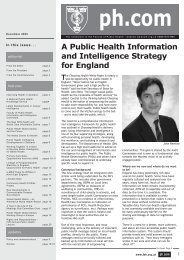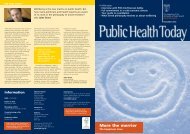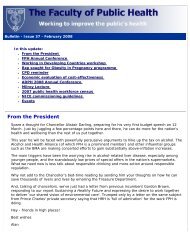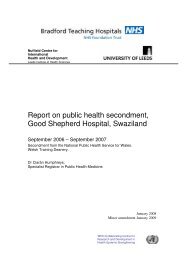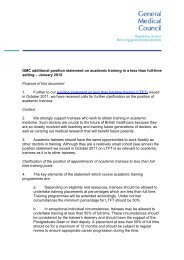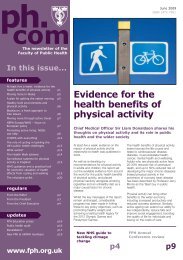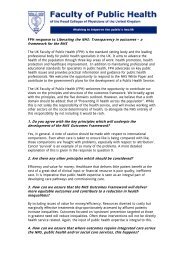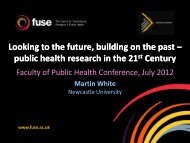PHT June 2011_Jan 10 - UK Faculty of Public Health
PHT June 2011_Jan 10 - UK Faculty of Public Health
PHT June 2011_Jan 10 - UK Faculty of Public Health
Create successful ePaper yourself
Turn your PDF publications into a flip-book with our unique Google optimized e-Paper software.
INTERVIEW<br />
Graham Allen, Labour MP for Nottingham North, delivered<br />
his review Early Intervention: the Next Steps in <strong>Jan</strong>uary, and<br />
his follow-up report on financing the approach is just out.<br />
Here he talks to <strong>Public</strong> <strong>Health</strong> Today about what he sees as<br />
the main opportunities and challenges<br />
‘Smoke alarms,<br />
Intervene early and save billions, says Allen<br />
What inspired you to take up the early intervention<br />
‘banner’ in the first place?<br />
My own history in my own constituency, which has the highest<br />
teenage pregnancy rate in Western Europe, the fewest kids going<br />
on to university in the <strong>UK</strong>, and myself being born and bred in that<br />
constituency. It’s a white, working-class area with a lot <strong>of</strong> problems<br />
– but there’s nothing inherent in the kids to stop them achieving<br />
great things. The fundamental problem is an intergenerational<br />
cycle <strong>of</strong> dysfunction. I knew we could break into that by having an<br />
effective programme to give every baby, child and young person<br />
the social and emotional bedrock that most <strong>of</strong> us take for granted<br />
but which so <strong>of</strong>ten is not there because the transmission <strong>of</strong> good<br />
parenting skills has, for whatever reason, broken down.<br />
So how did you go about doing something about it?<br />
In 2005 I was asked to chair the local strategic partnership in<br />
Nottingham – and my vision was to create an ‘early-intervention<br />
city.’ We came up with a cycle <strong>of</strong> policies for ages 0-18 – some<br />
available to every baby, child or young person, and some<br />
specifically targeted. The general ones were things like family nurse<br />
partnerships (our ambition is to apply this to every child born in<br />
Nottingham and we’re well on the way); a SEAL [social and<br />
emotional aspects <strong>of</strong> learning] programme for every primary school<br />
child; and a life-skills programme – SRE [sex and relationships<br />
education], PSHE [personal social and health education], civic and<br />
financial awareness, etc – for secondary schoolchildren. Our<br />
specific interventions included a mentoring programme for eightyear-olds<br />
and help for children <strong>of</strong> persistent and prolific <strong>of</strong>fenders.<br />
And the review?<br />
On the strength <strong>of</strong> our experience in Nottingham I co-wrote a little<br />
book with Iain Duncan Smith, published in 2008, and in July 20<strong>10</strong><br />
David Cameron asked me to lead a review on early intervention.<br />
What has your review identified as the main<br />
challenges?<br />
The big one is that it takes time. You need persistence,<br />
consistency, sustainability. You need political commitment<br />
nationally and locally, which means an all-party approach. I’m not<br />
going to let the current dispute about cuts stop me from doing all I<br />
can for early intervention. I see our initiative as a poppy in the<br />
battlefield – and to be fair we’re getting a lot <strong>of</strong> political mileage<br />
across the political spectrum.<br />
Where do you see the ‘Big Society’ fitting into this?<br />
I’ve always been a strong advocate <strong>of</strong> civic society, but it’s<br />
underdeveloped. We need to maximise the ability <strong>of</strong> local people<br />
to come up with their own answers. And we need to develop<br />
effective partnerships between civic society and a much more<br />
independent local government to achieve the sort <strong>of</strong> social<br />
consensus to make things happen.<br />
And do you think that the business world has a part<br />
to play?<br />
Yes, an important part locally and nationally. Locally, through<br />
partnerships engaging with businesses to invest in the future <strong>of</strong><br />
the entire community. Nationally, we’ve floated the idea <strong>of</strong> an<br />
Early Intervention Foundation. Although government will always be<br />
the main funder <strong>of</strong> programmes, there’s room for a small but<br />
significant non-government arm which would pull together the Big<br />
Society Bank, the Big Lottery and various foundations to provide<br />
some start-up funding and act as a conduit for investment from<br />
the private sector. If the Government creates the right mood music<br />
we could get some solid private investment. More private sector<br />
organisations are seeing that social investment can be as pr<strong>of</strong>itable<br />
as investing in c<strong>of</strong>fee futures or the gold market. Let’s face it, the<br />
City could do with a bit <strong>of</strong> positive PR right now.<br />
4 PUBLIC HEALTH TODAY



